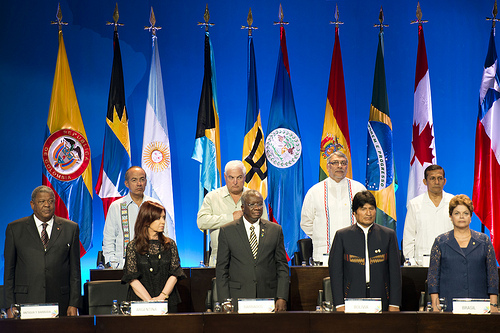April 15, 2012, was the final day of the Sixth Summit of the Americas (known since its first edition as, “Connecting the Americas: Partners for Prosperity”), held in Cartagena, Colombia, and endorsed by the Organization of American States (OAS).
The summit brought together 31 presidents from countries in the Americas. Cuba was not invited for “not being a democratic country,” and, despite the interest of several presidents to allow the island the opportunity to be part of the upcoming summits, the sixth summit ended without an agreement on Cuba's participation. This was not the only issue [es] that lacked an agreement; consensus was not reached on two other prominent issues during the summit: the legalization of drugs and the sovereignty of the Falkland Islands.
Despite the five official themes in the agenda (security, environment and natural disasters, physical integration, access to technologies, poverty and inequality), the attention centered around these three issues [es] which had as its main opponent the President of United States of America, Barack Obama. This was allegedly crucial to not signing a final declaration. However, the President of Colombia, Juan Manuel Santos, said that the summit accomplished some compromises (to be known later) and a mandate for the (OAS).
What did reach a consensus was the bilateral meeting between President Obama and President Santos, where they signed the free trade agreement between the United States and Colombia which will take effect on May 15 this year. Also, the United States extended the validity of five-year visas of to ten years for Colombians.

Opening Ceremony of the Sixth Summit of the Americas. Image by Flickr user Gobierno Federal (CC BY-NC-SA 2.0)
This, coupled with other events during the summit, generated numerous comments on traditional and citizen media in Colombia and in the region in general. Among the regional issues on the spotlight were the early exit of some presidents, such as Evo Morales of Bolivia and Cristina Fernandez de Krichner of Argentina, the absence of the president of Ecuador (Rafael Correa), the president of Nicaragua (Daniel Ortega) and the president of Venezuela (Hugo Chavez), and the uninvited countries such as Haiti and Cuba.
Implications for the host country
Apart from analyzing the regional issues previously mentioned, Colombian netizens also focused on the social events that increased the costs [es] of the summit, on the scandal involving prostitutes and several members of President Obama's Secret Service, on the unprecedented idea of the people of Turbaco to give President Obama a donkey [es], and on the wrong [es] interpretation of the Colombian national anthem by Colombian singer Shakira.
Andres Barreto, from online magazine Kien & Ke, mentions the alleged amount of dollars [es] that the event cost:
La Cumbre, según información general no confirmada, costó cerca de USD$97 millones, lo que contrasta con los presupuestos de las entidades públicas, así como con las necesidades del pueblo cartagenero de a píe, generalmente sumido en la pobreza, desigualdad y falta de oportunidad.
Barreto refers [es] to the donkey for Obama and other events to conclude with a question that many asked:
Pero, más allá del burro, del malogrado himno entonado por Shakira, y de las ausencias previsibles (Chávez, Ortega y Correa), el malestar de Cristina, y el escándalo del servicio secreto con prostitutas de la ciudad heroica, es menester preguntarse, ¿qué nos dejó la Cumbre?
Gloria Ortega Perez in the blog Sentipensantes [es] shares some conclusions that are not very encouraging, since she thinks that there is no unified message among countries in the Americas:
La conclusión más general y de mirada de árbol es que estamos juntos pero no unidos, en el disenso y en el consenso. Es lo que somos. No hay mensajes unanimistas aplanadores. Un nuevo discurso será posible con más diálogo y más cumbres.
Columnist Laura Gil is quoted questioning the continuity of these summits in the site Razón Pública [es]:
“Yo creo que esta fue la última cumbre. En 1994 se planteó que las Cumbres eran el escenario propicio para el diálogo entre Estados Unidos y América Latina. Pero no hay diálogo, no hay consenso, no hay avances en ninguno de los temas clave”.
The blog El Centauro [es] shares a positive conclusion of the event, highlighting that it showed a positive image of Colombia abroad.
Más que resultados concretos (aunque también se presentaron), el mayor beneficio que le dejó la Cumbre de las Américas a Colombia fue la buena imagen que el país proyectó ante el mundo.
On Twitter, Laura Gil (@Lauraggils) [es] criticizes an article by Semana magazine [es]:
Portada de @revistasemana: “La Cumbre de las Américas dejó a los colombianos llenos de orgullo y optimismo”. ¿Nos creen tarados?
Meanwhile, videos and reviews are multiplying [es] around Shakira's singing of the national anthem, where she replaces “sublime” with “ublime”, a word that doesn't mean anything in Spanish. The issue was a local Trending Topic on Twitter for days with the tags “Ublime” and “Shakira”. Users have also created games [es], and even former Senator Piedad Cordoba [es] joked about the singer's error.
But Nicholas Motta (@ jnicolas_motta ), like others, recognizes the Shakira's speech in front of businessmen who met alternately at the summit, and links lto the video [es] on YouTube.
On the other hand, Ricardo Infante (@ ricardoinfante2 ) [es] refers enthusiastically to the extent of U.S. visas for Colombians:
Que positivo nos dejo la cumbre nos ampliaron a 10 la visa
Maria Guevara (@ NinnaHippie ) [es] mentions the scandal with prostitutes and agents of the United States Secret Service:
En conclusión, la #CUMBRE nos dejó una nueva palabra [“ublime”], dos gringos ladrones y tres veces más pobres!
Finally, Ruben Finch H ( @ Pinzonhr ) [es] regrets that the “Lleras Law 2.0″ was approved within the framework of the Summit:
Y como olvidar: una #LeyLleras2 aprobada a la carrera para complacer TLC del patrón. Qué Vergüenza! Eso fue lo q dejo la #Cumbre. Ayy otra por favor!






